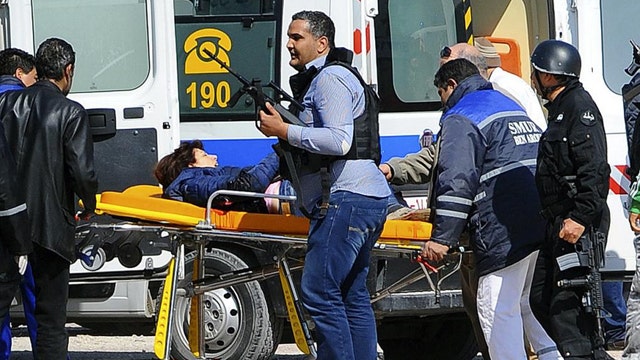Is ISIS behind the Tunisian museum attack?
No one has claimed responsibility for deadly attack that left 17 dead, but several factors point to the terror group
Two gunmen who opened fire on a popular museum in Tunisia Wednesday -- killing 21, including 17 tourists -- were killed by security forces after what was the deadliest attack on civilians in the North African country in 13 years.
The gunmen had opened fire on the National Bardo Museum in Tunis earlier Wednesday. At least 44 people were wounded
Tunisian Prime Minister Habib Essid had said earlier Wednesday that two or three other gunmen had escaped and were possible at large.
Essid told national television that people from Poland, Italy, Germany and Spain were among the tourists.
An Italian Foreign Ministry official says three Italians were among those killed in the attack and another six were injured. While Poland's Foreign Ministry announced that three Poles were among the wounded.
Colombian President Juan Manuel Santos confirmed on Twitter that two Colombian citizens were among the victims of the attack.
German Foreign Minister Frank-Walter Steinmeier called the violence "a cowardly attack on us all."
He said he "cannot rule out there being German citizens among the victims," but couldn't confirm that at this stage.
An unknown number of tourists were also taken hostage. But Tunisia’s interior ministry said the hostage standoff ended after security forces stormed the museum and killed two of the gunmen. A security officer and a cleaning woman were also killed in the raid.
Tunisia's parliament building, near the museum, was evacuated during the standoff, according to a tweet by parliament member Sayida Ounissi.
The interior ministry said tourists were taken hostage by “two or more terrorists armed with Kalashnikovs.” Private radio station Radio Mosaique said the attackers were dressed in military-style clothing.
British, Italian, French and Spanish nationals were among those taken captive, local radio reported, according to the BBC.
"I condemn this terrorist attack in the strongest terms... we are very alert about how the situation is evolving," French Prime Minister Manuel Valls said.
Yasmine Ryan, a witness, told the BBC that a growing crowd of at least 500 people has amassed outside the museum.
"There's helicopters flying overhead and we just saw tanks rolling in," she said.
Some of the Italians at the museum were believed to have been passengers aboard the Costa Fascinosa, a cruise liner making a seven-day trip of the western Mediterranean that had docked in Tunis. Ship owner Costa Crociere confirmed that some of its 3,161 passengers were visiting the capital Wednesday and that a Bardo tour was on the itinerary, but said it couldn't confirm how many passengers were in the museum at the time.
The cruise ship recalled all the passengers to the ship and was in touch with local authorities and the Italian Foreign Ministry.
The National Bardo Museum, built within a 15th-century palace, is the largest museum in Tunisia with collections covering two floors, and it houses one of the world's largest collections of Roman mosaics.
It is unclear who the attackers are. Tunisia has struggled with violence by Islamic extremists in recent years, including some linked to the Islamic State group.
Twitter accounts associated with the extremist Islamic State group based in Syria and Iraq were described as overjoyed at the attack, urging Tunisians to "follow their brothers," according to Rita Katz of SITE, a U.S.-based organization that monitors militant groups.
White House spokesman Josh Earnest says the U.S. is prepared to offer assistance to Tunisian authorities in their investigation of the attack against the Bardo museum and "will continue to stand with our Tunisian partners against terrorist violence."
"We extend our deepest sympathies to the victims of today's heinous violence in Tunisia and condemn in the strongest terms this terrorist attack, which took the lives of innocent Tunisians as well as visiting tourists," Earnest said.
Speaking at the Louvre museum to call for international efforts to preserve the heritage of Iraq and Syria against extremist destruction, French President Francois Hollande said he had called the Tunisian president to offer support and solidarity.
"Each time a terrorist crime is committed, we are all concerned," Hollande said.
Tunisia recently completed a rocky road to democracy after overthrowing its authoritarian president in 2011. It has been more stable than other countries in the region, but it has struggled with violence by Islamic extremists in recent years, including some linked to the Islamic State group. It also has extremists linked to Al Qaeda's North Africa arm who occasionally target Tunisian security forces.
A disproportionately large number of Tunisian recruits -- some 3,000, according to government estimates -- have joined Islamic State fighters in Syria and Iraq.
The violence that Tunisia has seen in recent years has been largely focused on security forces, not foreigners or tourist sites.
The attack is a blow to Tunisia's efforts to revive its tourism industry.
The museum is near the North African country's parliament some 2 1/2 miles from the city center. A new wing with contemporary architecture was built as part of a 2009 renovation, doubling the surface area. Some 8,000 works are displayed in the museum, according to the website.
The attack comes the day after Tunisian security officials confirmed the death in neighboring Libya of a leading suspect in Tunisian terror attacks and the killings of two opposition figures in Tunisia.
Ahmed Rouissi, a senior commander of ISIS militants in Libya, gained the nickname of the "black box of terrorism." The information on his death was made public by security officials giving testimony in parliament and cited by the official TAP news agency.
Libya, which has devolved into chaos, is a source of major concern for Tunisia.
Also a major worry is the Mount Chaambi area on the border with Algeria where Al Qaeda in the Islamic Maghreb has reportedly been helping a Tunisian group which has killed numerous soldiers.
The Associated Press contributed to this report.








































